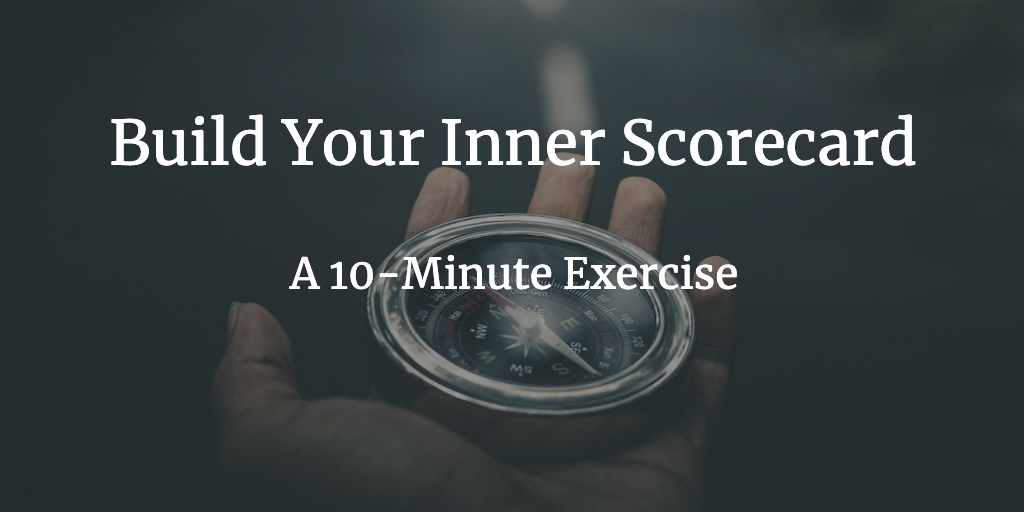What defines you? What does success look like? How can I make good decisions for myself in the long term?
My belief is that it’s important to operate our lives by an Inner Scorecard. While an Outer Scorecard is based on how the external world sees you, judges you, and stacks you up in comparison to others, an Inner Scorecard is something based on what you truly want without thinking too much about what other people think of you*.
Like many people I know, I’m at base an Outer Scorecard person. I’m always worrying about what other people think, making comparisons, and choosing paths based on how it looks. This was not necessarily a bad strategy, despite not knowing what I wanted out of life: it drove me to attend a top university, maximize my career and finances, and have a lot of fun along the way. I consoled myself that this is a path that preserves optionality. While I honestly didn’t know what I wanted to do, it is hard to go wrong doing what was expected of me. I was envious of others who seemed to have conviction and confidence about what they wanted out of their lives.
However, there are some challenges with this approach. A common problem that Outer Scorecard people often have is they don’t know what they want! So how do you work toward a goal if it’s undefined? It’s a good investment to work on figuring that out, and below I’ll share a tool I recommend to do so. Furthermore, while this initially seemed like a good strategy, following a life based on what others wanted is suboptimal for your happiness. It’s easy to get trapped along the way: a joyless but prestigious job, unfulfilling relationships, mismatched expectations, etc. If I continued on my path, I worried that I would wake up one day and see an overworked and unfulfilled person in the mirror spending my days in the exact opposite way that I actually wanted to spend them.
The Values Exercise
Doing this Values Exercise, adapted from Taproot Foundation, is one of the most useful tools that I’ve ever had in defining what I want.
It takes a short 10-15 minutes to complete and has helped me build my own Inner Scorecard.
Click here to get the exercise.
The output at the end of the exercise is a stack-ranked list of core values that define what you care about.
The beauty of the values exercise to build an Inner Scorecard is that it’s not a structured plan but more like a rubric. It’s not a life plan or charted path. Instead, it’s more like a compass that helps name elements that you care about so they can be considered in an explicit and intentional way.
As an example, here’s a list of my output:
- Build strong bonds with my chosen family
- Nurture happiness
- Seek growth opportunities
- Grow in wisdom
- Realize meaningful achievements
How to Apply the Values Exercise
Once you have your results, consider these questions:
How well are you living your values? If this is a scorecard for your life, how are you doing against them? It’s helpful to take a look at your past week’s calendar from this lens. When I’ve done this in the past, I’ve noticed points where I’ve needed to course-correct from workaholism to ensure I’m spending time and energy on key relationships and learning new skills.
How well does your decision align with your values? When considering big life decisions, how do the choices stack up? I’ve used this for decisions from career opportunities, relocation, and managing friendships. It’s been very helpful as a counterpoint to decisions that have very clear outer scorecards like career ($ or prestige) or social expectations (what you’re expected to do). Having the clarity of an alternative values scorecard exposes the happiness tradeoffs more clearly.
There are other ways to use this, as well! I asked some of my closest relationships to take this and in the process of talking through the words they chose I learned a lot more about what they care about. It’s also been an interesting insight into how I view others – whenever I run into anyone who is the opposite of those values, I’ve noticed that I have a stronger reaction.
Where paths diverge
More than social approval, more fame, more wealth, we need a life with less stress, more connection, and more meaningfulness. What that looks like is different for everyone. We’ll only have this if we are successful by our own scorecard.
*If you’re interested in hearing more about scorecards, this isn’t an original concept. The first time I ran into this concept was in Alice Schroeder’s biography of Warren Buffett and the concept has stuck.
